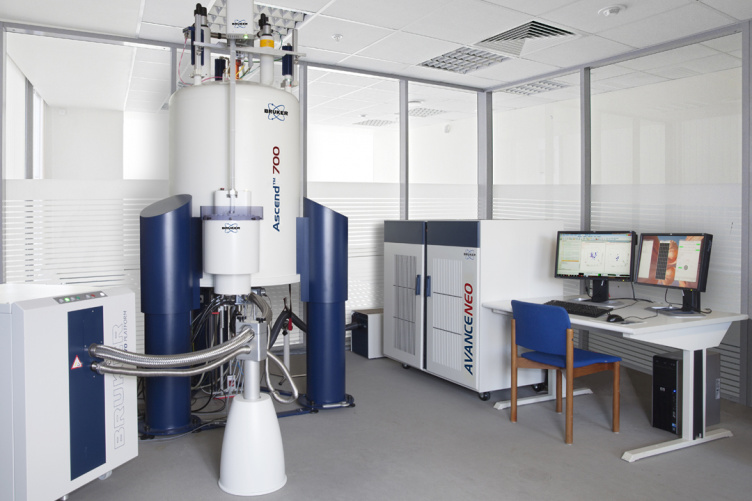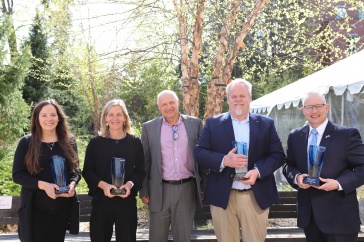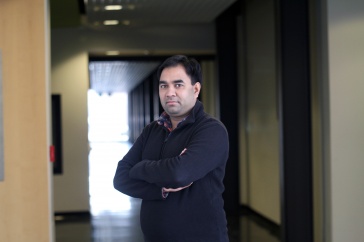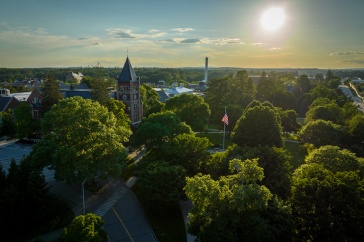
The University of New Hampshire is set to receive a multimillion-dollar nuclear magnetic resonance (NMR) spectrometer, which will significantly enhance the university’s research capabilities and establish a regional NMR facility in northern New England. The state-of-the-art instrument looks like a 1,500-gallon water tank on steroids, but the nondescript exterior belies an impressive apparatus capable of spurring significant advances impacting human health.
The new high-field 700 MHz NMR spectrometer will benefit at least 18 interdisciplinary research groups at UNH and support research programs at 14 other colleges and universities throughout New Hampshire, Maine and Vermont — a region that has been historically underrepresented in federal funding for research. Scientists at other institutions across the country will also be able to access the instrument through remote login.
NMR spectroscopy uses technology similar to magnetic resonance imaging (MRI). While MRI is most often used in the medical field, NMR spectroscopy is widely used to understand the structure and motion of molecules and analyze complex chemical and biological systems. The knowledge gained inspires innovations in the applied fields of biotechnology chemistry, medicine, and drug discovery —including how to produce more effective drugs and drugs with fewer side effects.
“UNH researchers and the regional scientific community will gain a competitive edge and develop nationally and internationally recognized research programs with the addition of this 700 MHz NMR,” says Krisztina Varga, assistant professor in the department of molecular, cellular and biomedical sciences. “And their research will now be conducted on campus, thus significantly enhancing advanced training opportunities for doctoral and master’s degree students, postdoctoral researchers, and undergraduates, who will develop skills in modern instrumentation to advance their career aspirations and professional development in the workforce.”
The instrument, which is expected to arrive in July 2019 and be operational in early fall, is funded by a $1.6 million grant from the major research instrumentation program of the National Science Foundation, with the university contributing an additional $700,000 dollars in matching funds. Varga is the principal investigator (PI) for the grant, and she is joined by co-PIs Rick Cote, professor of biochemistry, Jeffrey Halpern, assistant professor of chemical engineering, Samuel Pazicni, associate professor of chemistry, and Harish Vashisth, assistant professor of chemical engineering.
Patricia Wilkinson, analytical instrumentation scientist at the University Instrumentation Center, will provide user training on the instruments. She, along with Varga, will lead training workshops for graduate and undergraduate students.
Graduate students currently involved in computational analyses of model NMR datasets will now be able to translate these skills into first-hand acquisition and analyses of self-collected NMR data, and undergraduate students enrolled in courses such as Computational Molecular Bioengineering (BENG 755) will benefit from a visit to see the spectrometer and learn about its capabilities.
“We are all very excited for the acquisition of the new NMR spectrometer,” Halpern says. “I look forward to getting graduate and undergraduate students involved with using this new instrument in support of current laboratory projects. Students will gain a competitive edge in bioanalytical work because of the high sensitivity and versatility of this equipment.”
In addition to the new spectrometer, UNH’s existing 500 MHz NMR spectrometer will undergo a major upgrade funded by the university and an NIH COBRE: Center of Integrated Biomedical and Bioengineering Research (CIBBR) grant through an Institutional Development Award (IDeA) from the National Institute of General Medical Sciences.
An open house at the University Instrumentation Center will be announced in early fall to formally unveil the new spectrometer.
-
Written By:
Sarah Schaier | College of Life Sciences and Agriculture



















































